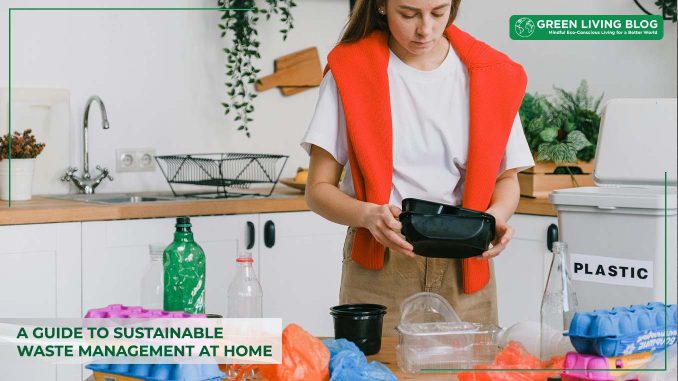
Amidst rising concern around the environmental challenges we are facing, the responsibility falls upon all of us to adopt more sustainable practices. At the forefront of this is sustainable waste management.
Waste management is a critical aspect of preserving our environment and ensuring a sustainable future for generations to come.
Every day, we produce vast amounts of waste, ranging from general household rubbish to chemical waste and electronic items, which, if left unchecked, can have severe consequences for ecosystems and human health.
In this guide, we’ll cover the knowledge and tools necessary to manage waste in a more environmentally responsible manner.
The Impact of Improper Waste Management

There are countless negative impacts of improper waste management. One of the most pressing issues is the contamination of soil, water, and air.
Landfills, often the final destination for unmanaged waste, release harmful chemicals and greenhouse gases as organic matter decomposes anaerobically. These emissions then contribute to air pollution and climate change, exacerbating global warming.
On top of this, when waste is not properly contained, it can leak hazardous substances into the soil and groundwater, contaminating water sources and posing risks to human health and ecosystems. Marine environments are particularly vulnerable to plastic pollution, with millions of tons of plastic waste entering our oceans and seas annually.
Dealing with Household Waste
Dealing with household waste requires a combination of care and mindfulness, mixed with practical strategies to minimise the environmental impact. Start by reducing waste at the source, opting for products with less packaging and only buying what is needed.
Embrace the concept of reuse by giving items a second life whenever possible, whether that’s through donation, repurposing, or DIY products.
Recycling also plays a crucial role in keeping waste out of landfills, so make sure you’re familiar with local recycling guidelines and ensure waste is sorted and disposed of correctly.
Composting: Turning Organic Waste into Nutrient-Rich Soil

Composting is a sustainable solution for managing organic waste, such as food scraps or biodegradable products. The benefits are multifaceted, not only is it a free and eco-friendly way to dispose of waste, but it also produces nutrient-rich soil which can be used to grow your own plants.
To start composting, designate a suitable area in your garden, or use a compost bin. Layer organic materials such as food scraps, garden waste, and even shredded paper. For best results, make sure you monitor the compost pile’s moisture levels and turn it regularly to help it decompose evenly.
Avoid composting meat, dairy, and oily foods as they can attract pests and produce bad odours. Additionally, diseased plants, weeds, and pet waste should be avoided as they can introduce pathogens or unwanted plants into the compost.
Hazardous Waste and Electronic Waste
Hazardous waste refers to materials that pose substantial risks to human health or the environment due to their chemical, physical, or biological properties. This includes substances like batteries, fluorescent bulbs, pesticides, and certain household cleaners. Proper handling of this waste involves identifying hazardous materials, segregating them from regular waste, and disposing of them at designated sites, like hazardous waste collection centres or recycling facilities.
Electronic items, which includes discarded electrical devices like computers, smart phones, and televisions, presents unique challenges due to its complex composition and potential for toxic components. Recycling these e-waste items properly is vital to recover valuable materials (such as certain metals) and reduce the environmental impact of electronic devices. Private waste companies and local recycling centres are typically able to deal with most types of electronic waste.
Creating a Waste Management Plan for Your Household

1. Assess Current Waste Generation
Conduct a waste audit to identify the types and amounts of waste generated by your household. From this, you can determine the areas where waste reduction and recycling efforts can be improved.
2. Set Goals and Targets
Establish specific goals for waste reduction, recycling rates, and composting participation.
It helps to have actionable targets and timelines to track progress towards achieving these goals.
3. Implement Strategies and Practices
Educate household members about the importance of sustainable waste management and the specific actions they can take. Waste separation systems for recycling and composting should slowly become integrated into your household’s daily routines. You can also explore innovative solutions such as reusable alternatives, upcycling projects, and community sharing initiatives.
4. Monitor and Adjust
Regularly monitor waste generation and diversion rates to assess the effectiveness of your waste management plan. Adjustments can be made as needed to address challenges and improve outcomes.
Hiring a Private Rubbish Removal Company
Hiring a private waste removal company presents a range of benefits. These experts have the skills and resources needed to manage waste disposal efficiently, while adhering to environmental regulations. The convenience factor cannot be overstated, with many companies even offering rubbish removal in London and other areas.
When choosing a waste removal company, opt for one which specialises in eco-friendly waste management practices. Be sure to enquire about their environmental commitments and have a read of their customer reviews to gauge whether they are suitable for you.
Conclusion
In this guide, we’ve explored the core principles of reduce, reuse, and recycle, delved into the advantages of composting, and provided insights on crafting an eco-conscious waste management strategy for your home. By adopting these green living strategies, you play a pivotal role in fostering a healthier future for both humanity and our planet.
We encourage you to persist in applying the techniques outlined in this guide and to seek out further avenues for reducing your environmental impact. Whether it involves composting kitchen scraps, responsibly disposing of electronics, or supporting businesses committed to sustainability, each small step contributes to a cleaner, more sustainable world.
![]()
Author Profile

- Eco Warrior by day, Eco Blogger by night trying to get the eco balance right.
Latest entries
 BusinessMay 3, 2024The Role of automated Loading Solutions for Sustainability
BusinessMay 3, 2024The Role of automated Loading Solutions for Sustainability Green Living HomeApril 23, 20246 Ways to swap to a greener Car sooner
Green Living HomeApril 23, 20246 Ways to swap to a greener Car sooner BusinessApril 22, 2024How to Go Green and Paperless at the Office
BusinessApril 22, 2024How to Go Green and Paperless at the Office EnvironmentApril 3, 2024Create the Perfect Summer Garden attracting Wildlife with a Lush Lawn from Seed
EnvironmentApril 3, 2024Create the Perfect Summer Garden attracting Wildlife with a Lush Lawn from Seed





Leave a Reply
You must be logged in to post a comment.